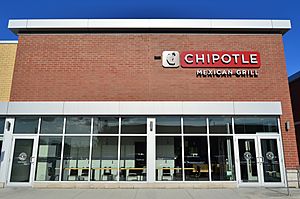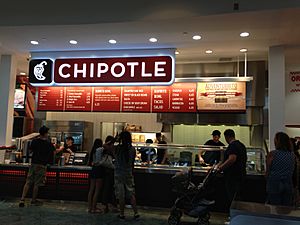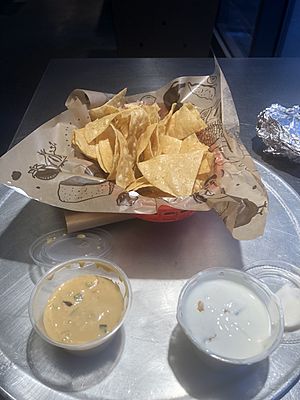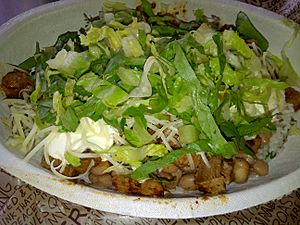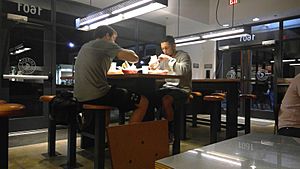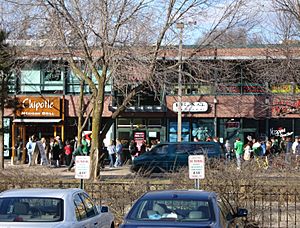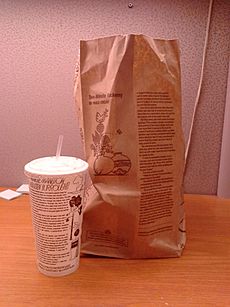Chipotle Mexican Grill facts for kids
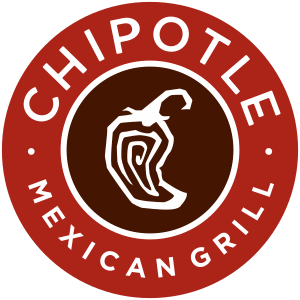 |
|
| Public | |
| Traded as | NYSE: CMG S&P 500 Component |
| Industry | Fast Casual |
| Founded | July 13, 1993 |
| Founder | Steve Ells |
| Headquarters | Newport Beach, California, U.S. |
|
Number of locations
|
|
|
Area served
|
United States, Canada, United Kingdom, Germany, France |
|
Key people
|
|
| Revenue | |
|
Operating income
|
|
| Total assets | |
| Total equity | |
|
Number of employees
|
64,570 (2017) |
| Subsidiaries |
|
Chipotle Mexican Grill, Inc. ( chih-POHT-lay), often known simply as Chipotle, is an American chain of fast casual restaurants in the United States, United Kingdom, Canada, Germany, and France, specializing in tacos and Mission burritos that are made to order in front of the customer. Its name derives from chipotle, the Nahuatl name for a smoked and dried jalapeño chili pepper. The company trades on the New York Stock Exchange under the ticker symbol CMG.
Chipotle is one of the first chains of fast casual dining establishments. Competitors in the fast-casual Mexican market include Qdoba Mexican Grill, Moe's Southwest Grill, Rubio's Coastal Grill, and Baja Fresh. Founded by Steve Ells on July 13, 1993, Chipotle had 16 restaurants (all in Colorado) when McDonald's Corporation became a major investor in 1998. By the time McDonald's fully divested itself from Chipotle in 2006, the chain had grown to over 500 locations. With more than 2,000 locations, Chipotle had a net income of US$475.6 million and a staff of more than 45,000 employees in 2015.
In May 2018, Chipotle announced the relocation of their corporate headquarters to Newport Beach, California, in Southern California, ending their relationship with Denver after 25 years.
Contents
History
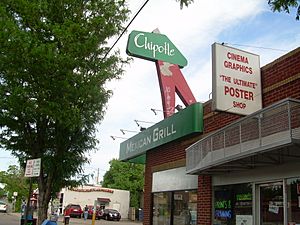
Founder Steve Ells attended the Culinary Institute of America in Hyde Park, New York. Afterward, he became a line cook for Jeremiah Tower at Stars in San Francisco. There, Ells observed the popularity of the taquerías and San Francisco burritos in the Mission District. In 1993, Ells took what he learned in San Francisco and opened the first Chipotle Mexican Grill in Denver, Colorado, in a former Dolly Madison Ice Cream store at 1644 East Evans Avenue, near the University of Denver campus, using an $85,000 loan from his father. Ells and his father calculated that the store would need to sell 107 burritos per day to be profitable. After one month, the original restaurant was selling over 1,000 burritos a day. The second store opened in 1995 using Chipotle's cash flow, and the third was opened using an SBA loan. To fund more growth, Ells' father invested $1.5 million. Afterwards, Ells created a board of directors and business plan, raising an additional $1.8 million for the company. Ells had originally planned to use funds from the first Chipotle to open a fine-dining restaurant, but instead focused on Chipotle Mexican Grill when the restaurants saw success.
In 1998, the first restaurant outside of Colorado opened in Kansas City, Missouri. The company opened its first location in Minnesota by opening near the campus of the University of Minnesota in Minneapolis in March 1999.
In 1998, McDonald's made an initial minority investment in the company. By 2001, the company had grown to be Chipotle's largest investor. The investment from McDonald's allowed the firm to quickly expand, from 16 restaurants in 1998 to over 500 by 2005. On January 26, 2006, Chipotle made its initial public offering (IPO) after increasing the share price twice due to high pre-IPO demand. In its first day as a public company, the stock rose exactly 100%, resulting in the best U.S.-based IPO in six years, and the second-best IPO for a restaurant after Boston Market. The money from the offering was then used to fund new store growth.
In March 2005, Monty Moran was appointed president and chief operating officer of Chipotle while Ells remained chairman and CEO.
In October 2006, McDonald's fully divested from Chipotle. This was part of a larger initiative for McDonald's to divest all of its non-core business restaurants — Chipotle, Donatos Pizza, and Boston Market — so that it could focus on the main McDonald's chain. McDonald's had invested approximately $360 million into Chipotle, and took out $1.5 billion. McDonald's had attempted to get Chipotle to add drive-through windows and a breakfast menu, which Ells resisted. In 2008, Chipotle opened its first location outside of the United States in Toronto.
In January 2009, president and chief operating officer Monty Moran was promoted to co-CEO, a position that he would share with Ells, while Moran retained his president position.
In a list of fastest-growing restaurant chains in 2009, Chipotle was ranked eighth, based on increases in U.S. sales over the past year, and in 2010 Chipotle was ranked third. Consumer Reports ranked Chipotle as the best Mexican fast-food chain in 2011. The company serves approximately 750,000 customers per day.
In December 2010, Chipotle hired chef Nate Appleman to develop new cuisine. Appleman has won Rising Star Chef from the James Beard Foundation, was named "Best New Chef" by the Food & Wine magazine, and competed on The Next Iron Chef.
In 2010, U.S. Immigration and Customs Enforcement (ICE) audited Chipotle's Minneapolis restaurants, and found that some employees had been hired using fraudulent documents. In December, Chipotle fired 450 employees from its Minneapolis restaurants as a result of the audit, resulting in protests by local groups. In February 2011, ICE expanded the audit to include 60 restaurants in Virginia and Washington, D.C. which resulted in 40 workers being fired. In April 2011, the criminal division of the attorney general's office in Washington, D.C., joined the case, and ICE agents began interviewing employees at 20 to 25 restaurants in other locations, such as Los Angeles and Atlanta. In response to the government investigations, Chipotle hired former director of ICE Julie Myers Wood and high-profile attorneys Robert Luskin and Gregory B. Craig.
In December 2016, Chipotle announced that co-CEO Monty Moran has stepped down from his role effective immediately with Ells becoming the sole CEO. Eleven months later, Ells announced in November 2017 that he would be stepping down as CEO.
In December 2017, Chipotle announced it signed a 15-year lease and in late 2018 will move around 450 corporate employees – currently housed in multiple buildings around downtown Denver – into the new 1144 Fifteenth Tower and occupy around 126,000 square feet or 5 floors of the 40-story tower.
In February 2018, Chipotle announced that Taco Bell CEO Brian Niccol would replace Ells as CEO starting on March 5 while Ells would retain his chairman position. Many industry analysts praised Niccol's appointment saying that Chipotle "needed new blood." Chipotle stock went up $30.27, or 12.04%, as a result of the announcement. However, other analysts criticized the announcement by saying that "the move goes against everything the burrito chain stands for."
In May 2018, Chipotle announced that it would relocate headquarters from Denver to Newport Beach, California in Southern California. Corporate functions handled in their Denver and New York offices would move to Newport Beach or to an existing office in Columbus, Ohio. This move would impact 400 workers, some being offered relocation and retention packages.
In June 2018, the company announced the closing of 65 under-performing restaurants.
Ells broke all ties with the company in March 2020 by resigning as its chairman and departing from its board of directors.
Other restaurant expansion
In 2011, Steve Ells was a judge for the TV show America's Next Great Restaurant and investor of ANGR Holdings, the company that will be running the winning concept's restaurants. Chipotle has agreed to purchase Ells' investment in ANGR at his cost, provide support for ANGR operations, and invest a total of $2.3 million in cash contributions. The winning concept, Soul Daddy, was quickly closed after operating for less than 5 weeks.
In September 2011, Chipotle opened an Asian fast-casual concept restaurant named ShopHouse Southeast Asian Kitchen in Washington, D.C. The company has said the new restaurant "would follow the Chipotle service format and its focus on 'food with integrity' in ingredients." Chipotle's plan was to start with only one store, and see how the restaurant works out before expanding the concept.
In April 2014, Chipotle announced an increase in menu prices for the first time in nearly three years, due to increasing costs for steak, avocados, and cheese. The price increase was expected to be rolled out from the end of second quarter of 2014 through the end of the third quarter. In late 2015, Chipotle expanded its mobile strategy through delivery partnerships with tech startups like Tapingo, a delivery service that targets college campuses.
On July 29, 2016, the company announced the opening of its first Tasty Made burger restaurant in the fall. Chipotle was still dealing with the various virus outbreaks with additional marketing. The company was also reducing the number of new stores for the year from 235 to 220.
The newer restaurant concepts did not perform as well as expected so that ShopHouse Southeast Asian Kitchen and Tasty Made were respectively closed in March 2017 and February 2018 leaving only Pizzeria Locale operating besides the parent company.
International
According to an article in The Motley Fool, Chipotle had 17 locations outside of the United States by October 2014 with the majority in Canada, and the UK was in the process of opening more locations. The rate of overseas expansion was slower than expected. Many of the press reviewers thought that the food was overpriced for their area.
As of 2018 there are 33 locations outside of the United States with 19 locations in Canada (Ottawa, Toronto, Markham, Vaughan, Mississauga, Oakville, Vancouver), 6 locations in The United Kingdom (London), 6 in France (Paris), and 2 in Germany (Frankfurt).
Canada
In August 2008, Chipotle opened its first location outside of the United States in Toronto. The second location in Toronto–and in all of Canada–was not opened until 2010.
The first Canadian location outside of the Toronto area was opened in Vancouver in December 2012. A second Vancouver-area location was opened in Burnaby in October 2014 followed by a third in Surrey in January 2016, a fourth in Langley in October 2016, and a fifth in West Vancouver in March 2018.
The first location in the nation's capital of Ottawa was opened in February 2017 at the Rideau Centre.
United Kingdom
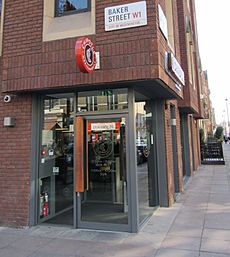
Chipotle expanded to Europe with the first European restaurant opening in May 2010 in London. A second location opened in London in September 2011. The following year, three additional locations were quickly opened in the London area. After this growth spurt, the rate of further expansion in London slowed greatly with the sixth location appearing in 2013 and the seventh in June 2015. Although Chipotle blames the slow growth in the United Kingdom on the British unfamiliarity with Mexican foods, several locally owned burrito chains had opened locations across the United Kingdom during the same interval.
France
The first location in France opened in Paris in May 2012.
Expansion in France was much slower than that in the United Kingdom or Canada, with a second location in Paris opening in 2013 and a third location in 2014. At 7,000 square feet, the restaurant at La Défense is, as of 2015[update], the largest Chipotle location in the world, while a typical Chipotle restaurant is usually between 2,200 and 2,500 square feet. A fourth Parisian location was opened in Levallois-Perret in 2015 followed by a fifth and a sixth Parisian location in 2016, both in Saint-Germain-des-Prés.
Germany
The first location in Germany opened up in Frankfurt's Skyline Plaza shopping mall in August 2013.
A second location opened in Frankfurt's MyZeil shopping mall in April 2019.
Menu
Chipotle's menu consists of five items: burritos, bowls, tacos, quesadillas, and salads. The price of each item is based on the choice of chicken, pork carnitas, barbacoa, steak, carne asada, tofu-based "sofritas", or vegetarian (with guacamole, which would be at an extra charge otherwise). Additional optional toppings are offered free of charge, including: rice, beans, four types of salsa, sour cream, cheese, and lettuce.
When asked in 2007 about expanding the menu, Steve Ells said, "[I]t's important to keep the menu focused, because if you just do a few things, you can ensure that you do them better than anybody else." Chipotle also offers a children's menu. Most restaurants sell beer and margaritas in addition to soft drinks and fruit drinks.
The majority of food is prepared in each restaurant. Some exceptions are the beans and carnitas, which are prepared at a central kitchen in Chicago, Illinois. None of the restaurants have freezers, microwave ovens, or can openers.
The chain experimented with breakfast foods at two airports in the Washington (D.C.) metropolitan area but decided against expanding the menu in that direction. Starting in 2009, selected restaurants had offered a pozole soup, which has since been discontinued.
In June 2015, Chipotle began test marketing a pork and chicken chorizo-type sausage as a new protein option at selected locations in the Kansas City area. Some food writers have expressed their health related concerns over the protein's relatively high sodium content since a 4-ounce serving contains 293 calories and 803 milligrams of sodium while the American Heart Association’s recommended daily amount is less than 1,500 milligrams of sodium. In contrast, the protein options with next highest sodium contents are Barbacoa with 530 milligrams and sofritas with 555 milligrams. An earlier version on the Mexican sausage was tested in Denver and New York City in 2011, but that test was terminated when that version of the sausage was perceived as looking too greasy. Chorizo was discontinued in September 2017 but was returned to the menu in the following year for a limited time.
In July 2020, Chipotle began test marketing a cauliflower rice option at 55 locations in Colorado and Wisconsin.
Chipotle accepts fax orders, and in 2005 the company added the ability to order online from their website. For both online and fax orders, customers proceed to the front of the line to pay for pre-ordered food. In 2009, Chipotle released an app for the iPhone that allows users to find nearby Chipotle locations, place an order, and prepay with a credit card. In 2013, Chipotle released an Android app that allows users to locate nearby Chipotle locations, place an order, prepay with a credit or gift card, and access favorites and recent orders.
Nutrition
In 2003, a Center for Science in the Public Interest report stated that Chipotle's burritos contain over 1,000 calories, which is nearly equivalent to two meals' worth of food. MSNBC Health.com placed the burritos on their list of the "20 Worst Foods in America" because of their high caloric content and high sodium. When a burrito with carnitas, rice, vegetables, cheese, guacamole, and salsa was compared with a typical Big Mac, the burrito had more fat, cholesterol, carbohydrates, and sodium than the Big Mac, but it also had more protein and fiber. The restaurant has also received praise – Health.com included the restaurant in its list of the "Healthiest Fast Food Restaurants".
Chipotle's vegetarian options include rice, black beans, fajita vegetables (onions and bell peppers), salsa, guacamole and cheese. All items other than the meats, cheese, sour cream, and honey vinaigrette dressing are vegan. As of late 2013, Chipotle developed a new cooking strategy for the pinto beans, eliminating the bacon and making them vegetarian and vegan-friendly. The cheese is processed with vegetable-based rennet in order to be suitable for vegetarians. In April 2010, Chipotle began testing a vegan "Garden Blend" option, which is a plant-based meat alternative marinated in chipotle adobo, at six locations in the U.S. The flour tortillas used for the burritos and soft tacos are the only items that contain gluten.
Food sourcing
In 1999, while looking for ways to improve the taste of the carnitas, founder Steve Ells was prompted by an article written by Edward Behr to visit Concentrated Animal Feeding Operations (CAFOs). Ells found the CAFOs "horrific", and began sourcing from open-range pork suppliers. This caused an increase in both the price and the sales of the carnitas burritos.
In 2001, Chipotle released a mission statement called Food With Integrity, which highlighted Chipotle's efforts to increase their use of naturally raised meat, organic produce, and dairy without added hormones. Chipotle only uses the leg and thigh meat from its chickens; the breast meat is sold to Panera Bread.
Ells has testified before the United States Congress in support of the Preservation of Antibiotics for Medical Treatment Act, which aims to reduce the amount of antibiotics given to farm animals.
Since 2006, the Coalition of Immokalee Workers (CIW), a Floridian farmworker organization, has protested Chipotle's refusal to sign a Fair Food agreement, which would commit the restaurant chain to pay a penny-per-pound premium on its Florida tomatoes to boost tomato harvesters' wages, and to only buy Florida tomatoes from growers who comply with the Fair Food Code of Conduct. In 2009, the creators of the documentary film Food, Inc. (along with 31 other leaders in the sustainable food movement) signed an open letter of support for the CIW's campaign, stating that, "If Chipotle is sincere in its wishes to reform its supply chain, the time has come to work with the Coalition of Immokalee Workers as a true partner in the protection of farmworkers rights." In September 2009, Chipotle announced that it would sidestep partnership with the CIW and instead work directly with East Coast Growers and Packers to increase wages for its tomato pickers. Ells framed the dispute as a fundamental issue of control, stating that, "the CIW wants us to sign a contract that would let them control Chipotle's decisions regarding food in the future." In October 2012, Chipotle signed an agreement with the CIW and became the 11th company to join the organization's Fair Food Program.
In January 2015, Chipotle pulled carnitas from its menu in a third of its restaurants; company officials cited animal welfare problems at one of the suppliers, found during a regular audit, as the reason. Subsequently, a false rumor spread online claiming it was done to appease Muslims who consider pork to be unclean, leading to some protests on social media. The company still uses antibiotic-free and hormone-free steak in its restaurants, despite being briefly forced to "serve beef that is not naturally raised" during the summer of 2013, posting an in-store notice each time that occurred. Roberto Ferdman of The Washington Post opined that Chipotle's stated mission to sell "food with integrity" may be "untenable" if meat producers continue to breach Chipotle's ethical standards.
Also in 2015, Chipotle stopped using genetically modified corn and soy beans in their foods, claiming to be the first nationwide restaurant to cook completely GMO free. However, in 2019, Chipotle paid $6.5 million to settle a lawsuit where the plaintiffs claimed that the company's food "may have been sourced from livestock that consumed GMO animal feed.”
Data breaches
Chipotle had two known incidents in which customer credit card payment information was stolen.
2004 data breach
In May 2006, Chipotle filed a report with the U.S. Securities and Exchange Commission that the company may have experience theft of credit and debit card data that might have existed as far back as 1999, when the company first accepted credit and debit cards as payment, until August 2004 when the merchant bank that process their credit and debit card transactions had informed Chipotle of the possible theft of credit and debit card information. Although the Chipotle claimed that there was no proof that theft of credit and debit card information had actually occurred, the results of outside forensic auditing firms concluded that the company's use of flawed card processing software and the use of unsecured internet gateways by some of their computers may have made their information systems at the affected restaurants vulnerable during periods before August 2004. The company spent $5.5 million to settle legal claims, and pay fines and related legal fees. The general public was not informed of the company's data security problems when the company first became aware of the situation.
2017 data breach
In April 2017, Chipotle first announced that their point of sale payment system was compromised during a three-week period from late March to mid-April but gave very little information about the incident. The following month, the company later revealed that 2,250 restaurants in 47 states were involved which could potentially affect hundreds of thousands of customers who may had their credit or debit card account information with security codes stolen. A few restaurants in Canada were also affected. Some security experts criticized the way Chipotle had downplayed the incident. During the same month, a credit union in New Hampshire filed a class action lawsuit on the behalf of banks and credit unions against Chipotle for failure to provide elementary credit card data security in the most recent data breach after a similar data breach that had occurred in 2004. In July 2017, Gainesville, Florida, police reported that an unidentified person took more than $17,000 from an ATM at a local credit union by stealing from 40 different accounts that can be traced directly to the data breach.
Advertising and publicity
In the past, Chipotle mainly relied on billboards, radio ads, and word of mouth to advertise. In 2012, Chipotle aired its first nationally televised commercial during the 54th Annual Grammy Awards ceremony. In 2010, the company initiated an ad campaign that mocks advice given to Chipotle by advertising agencies. Chipotle has run many promotions giving out free food to potential customers, especially when opening a new store. Stores also give out free burritos on certain holidays; for instance, on Halloween, some locations have had promotions in which free burritos are given to people who come dressed as a burrito. Chipotle gave away free burritos to reporters during the 1997 trial of Timothy McVeigh, which took place in Chipotle's hometown of Denver. In addition, stores offered free burritos to those displaced by Hurricane Katrina. Chipotle received attention when Ozzy Osbourne's reality show The Osbournes featured the company's burritos heavily. For Halloween 2010, Chipotle announced that customers dressed as a processed food product would receive a burrito for $2. The event was part of a $1 million fundraiser for Jamie Oliver's Food Revolution called "Boorito 2010: The Horrors of Processed Food." For "Boorito 2011", customers dressed in costumes "inspired by family farms" will receive a menu item for $2, with proceeds from the promotion going to The Chipotle Cultivate Foundation and Farm Aid. The promotion is aimed to increase awareness of family farms. Also in support of family farms, Chipotle released music videos of Karen O of the Yeah Yeah Yeahs and Willie Nelson. On September 12, 2013, Chipotle released an animated short called The Scarecrow, with a companion mobile video game; both feature a narrative heavily critical of industrial farming, but little in the way of direct marketing for the chain. The short features a cover of "Pure Imagination" from Willy Wonka & the Chocolate Factory, sung by Fiona Apple. It was named one of the worst advertisements of 2013 by The Wall Street Journal.
In 2011, Chipotle created the "Farm Team", which is a rewards program available only by invitation from restaurant managers. The Farm Team members have access to a special Chipotle website, where members can earn rewards, i.e. free food and T-shirts. The site offers members to, "learn where Chipotle’s food comes from, take quizzes and polls, play games and watch videos about the company". In April 2014, the Farm Team program was shut down.
Chipotle sponsors Team Garmin-Barracuda (formerly Team Garmin-Chipotle, Team Garmin-Slipstream, Team Garmin-Transitions and Team Garmin-Cervélo) of the International Cycling Union, and is an official team partner of the Boston Celtics, and the Boston Bruins. In June 2009, Chipotle sponsored free screenings of Food, Inc., a film that criticizes the corporate food industry. Founder Steve Ells stated that he hoped the film would make customers appreciate Chipotle's Food With Integrity policy. From May until September 2009, Chipotle ran a contest on mychipotle.com, a microsite which had a competition for the best user-created audio and video presentations about different combinations of ingredients. In July 2010, Chipotle began a campaign to support healthier lunch alternatives for students, in which money will be donated to The Lunch Box program based on how many spam E-mails consumers forward to a company E-mail address. For Chipotle's 18th anniversary, the company began wrapping its burritos in gold foil as part of a larger promotion to draw attention to its Food With Integrity mantra. Also as part of the gold foil campaign, Chipotle is offering prizes for customer-created pictures of items wrapped in gold foil. Chipotle hired comedian Amy Sedaris to create a comedic how-to video on wrapping with gold foil, and spread the video using Twitter. In March 2013, Chipotle pulled its sponsorship of a Boy Scouts of America event, citing that organization's ban on LGBT members.
On March 14, 2016, a National Labor Relations Board (NLRB) administrative law judge concluded that Chipotle's social media policy, and more specifically its application towards an employee who posted tweets regarding wages and working conditions, violated the National Labor Relations Act (NLRA). A former Chipotle employee in Havertown, Pennsylvania, wrote a series of tweets from his personal account about hourly workers being required to work on snow days. Chipotle instructed the employee to delete the tweets. The NLRB judge determined that Chipotle's request to delete the tweets violated the NLRA even though the employee was not disciplined as a result of his tweets.
Architecture
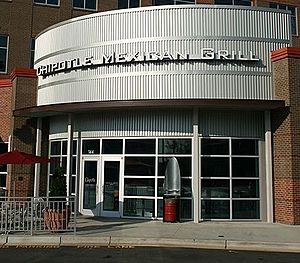
Architecturally, all Chipotle restaurants are built using most of the same materials (plywood, corrugated metal, stainless steel, exposed ductwork), although each store is unique. The interiors have been described as having an "industrial, sheet metal look". Chipotle has built restaurants using white ceramic tile instead of stainless steel. It costs the company approximately $850,000 to open a new restaurant. When the first Chipotle opened, Steve Ells asked his friend, sculptor Bruce Gueswel, to design the chairs and a styled Mayan king whose face was loosely based on that of civil rights movement leader Martin Luther King Jr., a personal inspiration of Gueswel, for the restaurant. Both items were made from wood and metal. Gueswel has continued to design and build the art and chairs for all subsequent Chipotle restaurants.
Most Chipotle locations display a photograph of the original restaurant, which is near the University of Denver campus on Evans Avenue. Instead of a photograph of itself, the original location has a photograph of the Dolly Madison Ice Cream that previously occupied the location. In 2010, Chipotle began opening smaller concept locations that have lower costs of development and occupancy. Chipotle uses environmentally friendly packaging, with bowls made from recycled newsprint, unbleached tray liners, and napkins and cups made from postconsumer waste.
Chipotle's architectural design team incorporates the principles of sustainable architecture in their projects. The "green" restaurant in Gurnee, Illinois features an on-site six kilowatt wind turbine, which generates about 10% of the restaurant's electrical needs. The Gurnee restaurant has received Platinum level LEED certification from U.S. Green Building Council. A restaurant in Tulsa, Oklahoma, uses recycled drywall, low-VOC paint, and energy-efficient appliances. A Chipotle restaurant in Austin, Texas was the first to receive a four-star rating from the city's Green Building Program. Additionally, Chipotle has made arrangements to add solar panels to 75 of its restaurants. Chipotle has contracted to clean its stores in the New York metropolitan area, with "plant-based, environmentally preferable cleaning supplies and technologies." The cleansers are readily biodegradable and non-toxic to humans or aquatic life.
Chipotle was the defendant in a lawsuit for failure to comply with the Americans with Disabilities Act (ADA). Maurizio Antoninetti, a customer who used a wheelchair, claimed he was denied the "Chipotle Experience", because he was unable to see the food preparation. The case against the company was upheld in the United States Court of Appeals for the Ninth Circuit, and the Supreme Court of the United States declined to hear Chipotle's appeal, leaving the Ninth Circuit's ruling intact. Chipotle has "an official disability policy of bringing ingredients to the tables of diners with disabilities and doing tableside preparation." Chipotle is retrofitting restaurants affected by the ruling, replacing the walls in front of the food preparation area with lower ones or transparent panels. They are incorporating the new design elements into new restaurants. The case was one of over twenty ADA-related lawsuits filed by Antoninetti, who died in 2011.
Other restaurant units
- Pizzeria Locale is a fast casual pizza restaurant chain formed as a partnership with the original Pizzeria Locale, a single full-service pizza restaurant in Boulder, Colorado. The original Pizzeria Locale owners, Bobby Stuckey and Lachlan Mackinnon-Patterson, would continue to own their original location in Boulder while Chipotle would increase its stake in the chain over time. The first jointly owned location (with Chipotle) opened in Denver in May 2013. A second Denver location was opened in October 2014. The first location outside of Colorado was opened in Kansas City in July 2015. The first location in Cincinnati, the fourth in the chain, was opened in March 2016. By February 2017, the chain had grown to seven locations. In June 2018, Chipotle closed five Pizzeria Locale locations in Kansas City and Cincinnati, leaving two locations in Denver and one in Boulder still opened. In March 2019, Pizzeria Locale announced plans to open two additional locations within the Denver metropolitan area, one in Hale and the other in Stapleton. The planned Pizzeria Locale for Stapleton opened in December 2019, to make it the third location in operation. It was announced in February 2020 that the new Pizzeria Locale at the 9th and Colorado mixed-use development in Hale was expected to open later that year. The Hale restaurant finally opened in August 2020.
- Defunct units
- Soul Daddy was a soul food fast casual restaurant that was owned by ANGR Holdings, LLC, and was managed by Chipotle after purchasing Ells' stake in the company. The restaurant had three locations that had operated for less than 5 weeks in 2011 before closing.
- ShopHouse Southeast Asian Kitchen was an Asian fast-casual concept restaurant that was opened by Chipotle in September 2011. The company said that the new restaurant "would follow the Chipotle service format and its focus on 'food with integrity' in ingredients." Chipotle's plan was to start with only one store, and see how the restaurant works out before expanding the concept. By July 2016, the chain had 15 restaurants. All ShopHouse locations were closed on March 17, 2017.
- Tasty Made was a burger restaurant concept that Chipotle first opened in Lancaster, Ohio in October 2016. On July 29, 2016, the company announced the opening of its first Tasty Made burger restaurant in the fall. The first location was revealed to be in Lancaster, Ohio. Ohio was selected as culinary manager Nate Appleman and national training director David Chrisman are both from the state and helped design the concept. Tasty Made was announced to have a focused menu like early burger restaurants which were limited to burgers, fries and milkshakes. Chipotle had trademarked Better Burger earlier in the year. Tasty Made was closed on February 28, 2018.
Images for kids
-
A Chipotle restaurant located outside Capital One Arena in the Chinatown area of Washington, D.C. Note the Chinese characters on the sign.
See also
 In Spanish: Chipotle Mexican Grill para niños
In Spanish: Chipotle Mexican Grill para niños


